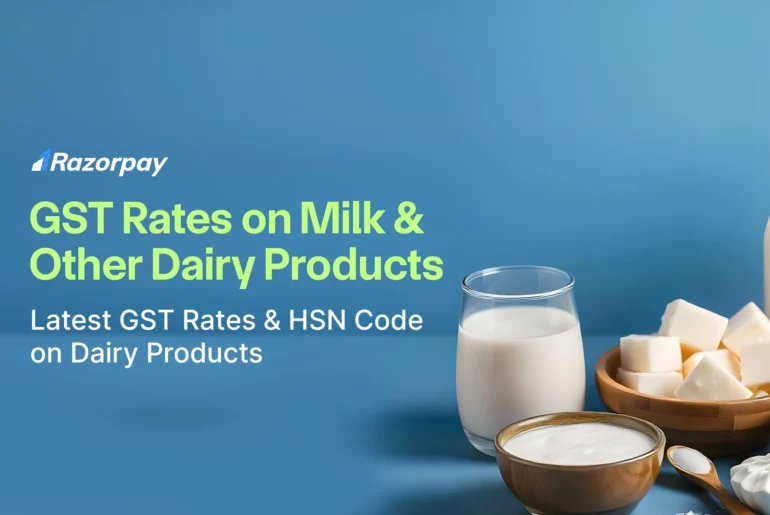Table of Contents
Latest Updates on GST for Milk Products
The 53rd GST Council has recommended a 12% GST on all milk cans, irrespective of material or use.
This decision follows the Council’s earlier move in the 47th GST council meeting to impose GST on pre-packed curd, lassi, and buttermilk to curb tax evasion.
Additionally, milking machines and dairy machinery were subjected to an 18% GST rate during the same meeting.
These changes, effective from July 18, 2022, aim to rationalize the GST structure and boost revenue from the dairy industry.
GST on Milk, Paneer, Curd and their HSN Codes
The GST rate on milk and dairy products now exempts essentials — fresh milk, pasteurized milk, UHT milk, paneer, and curd all attract 0% GST, while value-added items like skimmed milk powder, ghee, butter, cheese, and other packaged dairy products fall under the 5% slab.
Below is a detailed breakdown of GST rates on milk, paneer, curd, and other dairy products, along with their HSN codes:
1. List of Milk and Dairy Products with a 0% of GST Rate
Milk Products |
GST Rate |
HSN Code |
| GST on Fresh milk | 0% | 0401 |
| GST on Ultra High Temperature (UHT) milk | 0% | 0401 |
| GST on Pasteurized milk | 0% | 0401 |
| GST on Unsweetened, Unconcentrated milk and cream | 0% | 0401 |
| GST on Unpacked and Unlabeled Curd | 0% | 0403 |
| GST on Unpacked and Unlabeled Lassi | 0% | 0403 |
| GST on Unpacked and Unlabeled Buttermilk | 0% | 0403 |
| GST on pre-packed and labelled Chena or paneer | 0% | 0406 |
Read About: Find the List of Goods and Services Exempt Under GST
2. List of Milk and Dairy Products with a 5% of GST Rate
Milk Products |
GST Rate |
HSN Code |
| GST on Condensed Milk | 5% | 0402 91 10, 0402 99 20 |
| GST on Milk and cream containing sugar or other sweetening matter | 5% | 0402 |
| GST on Skimmed milk powder | 5% | 0402 |
| GST on Milk food for babies (other than condensed milk) | 5% | 0402 |
| GST on Yogurt | 5% | 0403 |
| GST on Kefir | 5% | 0403 |
| GST on Fermented or acidified milk and cream (whether concentrated or not, and whether sweetened, flavored, or containing added fruits, nuts, or cocoa.) | 5% | 0403 |
| GST on Pre-packaged and Labelled Curd | 5% | 0403 |
| GST on Pre-packaged and Labelled Lassi | 5% | 0403 |
| GST on Pre-packaged and Labelled Butter milk | 5% | 0403 |
| GST on Milk-based products consisting of natural milk constituents, sweetened or unsweetened, not elsewhere specified or included | 5% | 0404 |
| GST on Butter | 5% | 0405 |
| GST on Ghee | 5% | 0405 |
| GST on Butter oil | 5% | 0405 |
| GST on Oils derived from milk | 5% | 0405 |
| GST on Cheese | 5% | 0406 |
| GST on Soya milk drinks | 5% | 2202 99 10 |
| GST on Beverages containing milk | 5% | 2202 99 30 |
Related Read: GST on Sugar in India: Updated HSN Code & Tax Rates
3. List of Milk and Dairy Products with a 18% of GST Rate
Milking and Dairy Machines |
GST Rate |
HSN Code |
| GST on Milking machines | 18% | 8434 |
| GST on Dairy machinery | 18% | 8434 |
How to Calculate GST on Milk, Paneer, and Curd?
If you’re selling pre-packed and labeled curd or paneer, calculating the GST is straightforward:
Formula: GST Amount = Selling Price × GST Rate
For example, if you sell a packet of paneer priced at ₹100 with a 5% GST rate, the GST amount would be:
- GST Amount = ₹100 × 5% = ₹5
- Total Price = Selling Price + GST Amount = ₹100 + ₹5 = ₹105
Thus, the final selling price, including GST, would be ₹105.
Impact of GST on Dairy Industry
1. Effect on Dairy Farmers
Dairy farmers face increased costs due to the taxation on products like UHT milk and paneer, which could lower their profit margins. However, exemptions on raw milk help mitigate some financial pressures.
2. Impact on Consumers
Consumers experience higher prices for pre-packed and labeled dairy products due to the GST rate impositions. This price hike affects household budgets, particularly those heavily reliant on dairy products.
3. Challenges Faced by the Dairy Industry
The dairy industry grapples with compliance challenges, especially for small-scale producers unfamiliar with the GST framework. Ensuring accurate tax filings and claiming input tax credits are additional administrative burdens.
How to Claim GST Input Tax Credit on Dairy Products?
Businesses dealing in dairy products like milk, curd, paneer, etc., can claim Input Tax Credit (ITC) under GST, as per the CGST Act.
Eligibility Criteria for Claiming ITC (Section 16(1) of the CGST Act)
To claim ITC on dairy products, the following conditions must be met:
- Registered Person: The person must be registered under GST.
- Business Use: The dairy products must be used in the course or furtherance of business.
- Possession of Tax Invoice: A valid tax invoice or debit note from the supplier must be available.
- Receipt of Goods: The dairy products must have been received by the business.
- Tax Payment: The supplier must have paid the GST to the government.
- Return Filing: The GST return must be filed to claim the ITC.
These criteria ensure that ITC is only claimed for genuine business purposes.
When ITC Cannot Be Claimed (Section 17 of the CGST Act)
ITC cannot be claimed on:
- Personal Use: ITC is not available for dairy products used for personal consumption.
- Exempt Supplies: ITC is not allowed on exempt or non-taxable supplies like fresh milk.
Related Read: GST on Food Items & Restaurants – Rules and Rates For 2024
Process of Claiming ITC on Dairy Products
- Ensure GST Registration: Make sure your business is registered under GST to be eligible for claiming Input Tax Credit (ITC).
- Maintain Proper Documentation: Keep all necessary tax invoices, debit notes, and receipts for the dairy products purchased. Accurate record-keeping is crucial for claiming ITC.
- Verify Invoices with GSTR-2A: Cross-check your purchase invoices with the supplier’s GSTR-1 to ensure they match the details reflected in your GSTR-2A form.
- File GST Returns: File your GST returns (GSTR-3B for summary returns and GSTR-1 for outward supplies) on time and ensure accuracy to avoid any discrepancies.
- Claim ITC in GST Return: Declare the eligible ITC in the appropriate sections of your GSTR-3B return to claim the credit.
- Utilize ITC: Once ITC is claimed, it can be used to offset your output GST liability, reducing the tax you owe to the government.
Example of ITC Claim
Suppose you run a dairy business and purchase milk, curd, and paneer for resale. The total GST paid on these purchases is INR 10,000. When you sell these products, the GST collected is INR 15,000. You can claim ITC of INR 10,000, reducing your net GST payable to INR 5,000.
Evolution of GST Regulations on Milk Products
In the dynamic landscape of the dairy industry, maintaining affordable access to essential products like milk, curd, and paneer is crucial for both consumers and businesses. While these dairy staples were previously exempt from GST to keep prices low, the recent amendments reflect the government’s response to revenue challenges and market dynamics.
The 47th GST Council meeting has seen significant developments aimed at curbing revenue leakages associated with unregistered entities selling dairy products without GST compliance. This has raised concerns about fairness in the marketplace, especially for registered businesses.
Key Changes Include:
Fortified Toned Milk
According to CBIC Circular No. 52/26/2018-GST, issued on August 9, 2018, fortified toned milk remains exempt from GST when fortified with essential vitamins like A and D. This exemption underscores the government’s commitment to promoting health and nutrition among consumers while ensuring affordability under HSN code 0401.
Khoya/Mawa
Conversely, khoya (mawa) is classified as a concentrated milk product under HSN code 0402, and now incurs a GST of 5%, as per F. No. 332/2/2017-TRU, dated December 7, 2017. This adjustment indicates a shift in policy to strike a balance between necessary revenue generation and keeping essential dairy items accessible to the public.
Conclusion
Understanding the GST implications on milk, paneer, and other dairy products is crucial for both businesses and consumers. The revised GST rates and regulations aim to streamline the tax framework, though they also bring challenges in compliance and cost management. By staying informed and compliant with GST regulations, businesses can efficiently manage their tax obligations, while consumers can better understand the pricing of their dairy products.
Frequently Asked Questions (FAQs)
1. What is the GST on Milk?
Fresh milk remains GST-exempt, while pre-packaged and labeled milk are subject to a 0% of GST Rate.
2. Are all types of milk exempt from GST?
Not all types of milk are exempt from GST in India.
3. Can I claim an input tax credit (ITC) on purchases of milk products?
Yes, businesses can claim ITC on GST paid for milk products used for business purposes.
4. Is there GST on flavored milk?
Yes, flavored milk attracts a 5% GST rate.
5. Is there GST on Lassi or Yoghurt?
Lassi is exempt from GST, while yogurt attracts a 5% GST rate.
6. What is the GST rate on curd and buttermilk?
Unpacked and unlabeled curd and buttermilk are exempt from GST. However, pre-packed and labeled curd and buttermilk attract a GST rate of 5%.
7. Is there GST on ghee and butter?
Yes, both ghee and butter attract a 5% of GST rate.
8. Is there GST on milk powder?
Yes, milk powder attracts a 5% of GST rate.
9. What is the GST Rate on Milk Cans?
Uniform GST rate of 12% is applicable to all types of milk cans, regardless of the material used (steel, iron, aluminum, etc.)
10. How much GST is on a milking machine?
As per GST Guidelines, The GST rate on milking machines is 18%.
11. Is GST applicable on transportation of milk?
No, GST is not applicable on the transportation of milk.




